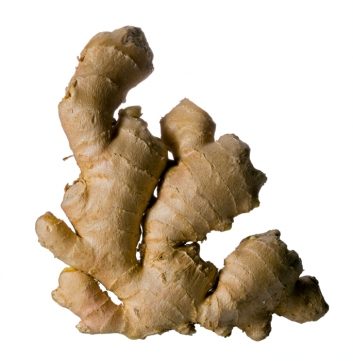
Ginger
Tangy and aromatic, ginger is a mixture of several hundred substances, including phenol compounds such as gingerols – potent anti-inflammatory compounds shown in clinical studies to help relieve the pain of arthritis and muscle discomfort. Shogaol and zingiberene, also present in ginger, have antioxidant capabilities that may help prevent heart disease and cancer. Ginger is also reputed to help reduce nausea, motion sickness and morning sickness.
Fresh ginger contains more gingerol and protease, also an anti-inflammatory. Look for ginger that is plump, firm and clean. Keep ginger in an open container in the cupboard, the same as fresh onions or garlic. Unpeeled ginger can be refrigerated for up to three weeks – up to six months in the freezer.
Adding ginger at the start of the cooking process will lend a subtler flavour to the meal. Putting it in near the end delivers a more pungent taste. Grating ginger will release more of the active ingredients than slicing or chopping.
You could try… using ginger for relief from nausea. Steep one or two 1cm slices of fresh ginger in a cup of hot water.
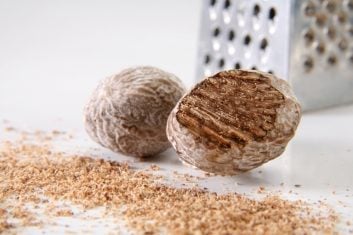
Nutmeg
Of all the sweet spices, nutmeg tastes the strongest. A nutty spice, nutmeg is the dried seed of the tropical nutmeg tree, Myristica fragrans. Researchers are coming up with some interesting health pluses: for example, nutmeg may have antibacterial properties that destroy E. coli, a food-borne bacterium. As well, tests on rats have shown that extracts significantly decrease blood glucose levels, stimulate the release of insulin from the pancreas, and improve liver and pancreas weight – all of which may help to manage diabetes. In high doses nutmeg is potentially toxic.
Freshly ground whole nutmegs give the best flavour, but the quality can vary enormously. If stored too long, whole nutmeg begins to dry out, losing some of its oils. Dried nutmeg powder is suitable for most kitchen purposes. Like most spices, keep nutmeg in a cool, dry place.
You could try… adding a little nutmeg to mixed vegetable dishes, spinach, veal or sauces for pasta. Also experiment with nutmeg in soups made from vegetables such as pumpkin, broccoli, carrot, spinach and onion.
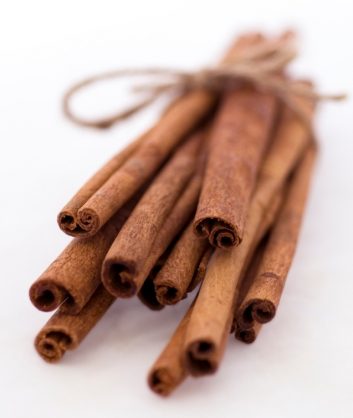
Cinnamon
Cinnamon, the bark of the cinnamon tree, is one of the oldest known spices. Fragrant, sweet and warm, it’s perfect for winter desserts. There is emerging scientific evidence that small amounts of cinnamon taken daily may be able to lower blood sugar levels in people suffering from diabetes. One U.S. study found that chewing cinnamon gum, or even just smelling the spice itself, could enhance people’s thinking skills, including memory and recognition.
The tubular cinnamon quills have a more woody aroma but are not easy to grind, so the powdered form is generally recommended for use in cooking. Whole quills will keep for two to three years if not exposed to extreme heat. Powdered cinnamon is best used within six months.
Fresh cinnamon should smell sweet, not musty.
You could try… drizzle flaxseed oil on wholegrain toast, then sprinkle with cinnamon and honey. Or warm your hands around a cup of hot milk simmered with honey and cinnamon sticks.
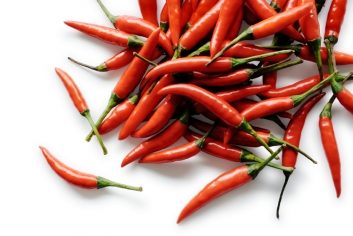
Chilli
Chilli’s distinctive bite certainly livens up a meal, but it can also bring tears to your eyes. Chilli gets its characteristic heat from capsaicin, which has been linked to benefits including weight-loss and improved cholesterol levels. Fresh chillies contain a high concentration of vitamin C (two to three times that of citrus fruit), fibre, potassium and vitamin B. Red chillies are rich in beta carotene, an antioxidant that helps destroy the free radicals associated with aging.
Choose fresh chilli peppers with vivid, deep colours and glossy, firm skins. Avoid those with soft areas or black spots. Store in the fridge for a week or two.
Bitten off more chilli than you can bear? A spoonful of sugar should provide instant relief, as will yoghurt or a slice of bread. Resist the temptation to lunge for water – it will make the burning worse.
You could try… mincing some chilli peppers and folding them into plain yogurt for a spicy dip or condiment. Chilli can also add zest to stir-fries and barbecued food.
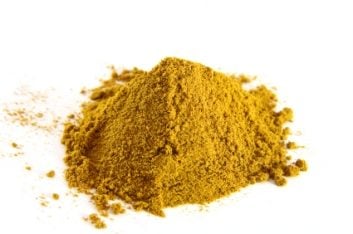
Turmeric
Turmeric comes from the root of the Curcuma longa plant and has a tough brown skin and orange flesh. Peppery, warm and bitter in taste, it smells a little like orange and ginger.The orange and yellow pigment in turmeric is known as curcumin.
Studies have demonstrated the anti-inflammatory, antioxidant and anti-cancer (colon, skin, breast) properties of turmeric. Research also suggests that turmeric may protect against Alzheimer’s disease and dementia.
Store in an airtight container or glass jar, and keep in a cool, dark place.
You could try… using turmeric in curries. You could also add it to stews and soups. It goes well with eggplant, beans, eggs, meat, fish and veggies. Mix brown rice with raisins and cashews, then season with turmeric, cumin and coriander.
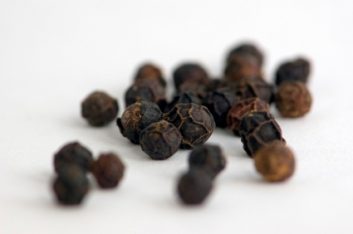
Black Pepper
Black pepper is a flowering vine in the family of Piperaceae. The same fruit produces white and green pepper. The spiciness of black pepper is due to the presence of the chemical piperine. Pepper contains high levels of manganese, an important antioxidant; vitamin K, which is needed for blood to clot normally; and iron. Piper nigrum, as it is known by spice enthusiasts, stimulates the tastebuds and prompts the stomach to increase secretion of hydrochloric acid, thereby aiding digestion.
Whole peppercorns should be free of blemishes and should be dull-looking, not shiny.
Pepper loses flavour and aroma through evaporation, so airtight storage helps preserve its original spiciness longer. As with all spices, store it in a cool, dark place to retain its flavour.
Once ground, pepper’s flavour and aromatics can evaporate quite quickly, especially during the cooking process, so grind whole peppercorns immediately before adding to recipes.
You could try… grinding pepper over smoked salmon, oysters, barbecues and grills.
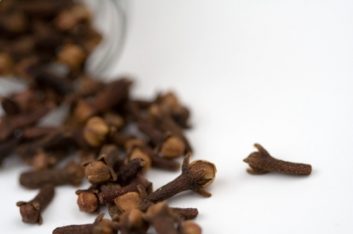
Cloves
Resembling an untidy jumble of small nails, whole cloves are the dried, unopened pink flower buds of the evergreen clove tree. They yield a complex flavour – pungent, warm and sweet, but also faintly peppery.
Eugenol is a chemical component of clove that has been used for its local-anaesthetic, anti-inflammatory and antibacterial effects (although studies are limited). In the U.S., eugenol extracts are often used in dentistry for these purposes. Cloves offer an excellent source of manganese, vitamin C and omega-3 fatty acids, all of which are beneficial for your cardiovascular system.
Look for clean, intact buds with soft little balls at the top, with the clove stems still attached. The stems contain about 30% of the clove’s volatile oil. When ground, cloves lose this volatile oil (and flavour) quite quickly.
Good-quality cloves will float vertically in water.
You could try… spicing up a fruit compote by adding ground cloves. Or add whole cloves to mulled wine with cinnamon sticks and coriander seeds. But be careful: cloves can easily overpower a dish, particularly when ground, so be sparing.

Cloves
Resembling an untidy jumble of small nails, whole cloves are the dried, unopened pink flower buds of the evergreen clove tree. They yield a complex flavour – pungent, warm and sweet, but also faintly peppery.
Eugenol is a chemical component of clove that has been used for its local-anaesthetic, anti-inflammatory and antibacterial effects (although studies are limited). In the U.S., eugenol extracts are often used in dentistry for these purposes. Cloves offer an excellent source of manganese, vitamin C and omega-3 fatty acids, all of which are beneficial for your cardiovascular system.
Look for clean, intact buds with soft little balls at the top, with the clove stems still attached. The stems contain about 30% of the clove’s volatile oil. When ground, cloves lose this volatile oil (and flavour) quite quickly.
Good-quality cloves will float vertically in water.
You could try… spicing up a fruit compote by adding ground cloves. Or add whole cloves to mulled wine with cinnamon sticks and coriander seeds. But be careful: cloves can easily overpower a dish, particularly when ground, so be sparing.
